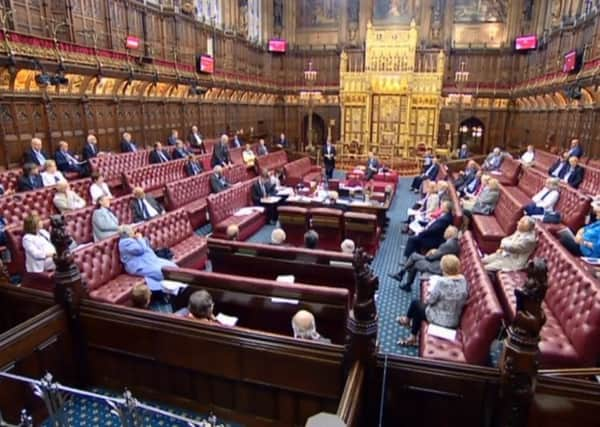Peers back decriminalising abortion in Northern Ireland but lack clarity about new regime


The Lords last night passed the thrust of last week’s momentous House of Commons vote for the full decrimalisation of abortion in Northern Ireland unless Stormont returns by October.
An amendment by Baroness O’Loan and Lord Morrow which sought to give Assembly members an effective veto on the change if a majority opposed it was overwhelmingly defeated by 138 votes to 39.
Advertisement
Hide AdAdvertisement
Hide AdNIO minister Lord Duncan said there would be a period of “limbo” between repealing the sections of the Offences Against the Person Act which make abortion a criminal offence and putting in place a new regime, which would require public consultation of up to 12 weeks.
But he insisted that period would not be a “free for all” and other law will still ban abortions beyond when life was viable outside the womb, saying that he said could “guarantee no abortions will be carried out over 24 weeks”.
He said that the new legislation would not allow abortions later than happens in England and Wales and “we would seek to see harmony”.
The minister said that conscience “must be at the heart of this – we cannot compel any practitioner to act beyond their own conscience and we must make sure that is understood in the guidance that is issued thereafter.,..it is absolutely critical for that.”
Advertisement
Hide AdAdvertisement
Hide AdDUP peer Lord Morrow said that abortion would be legal for any reason – including disability or gender – up to 28 weeks, when the limit is 24 weeks in England.
Lord Duncan disputed that time limit and there were conflicting interpretations between several peers as to what would be legal after the passage of the new law.
Baroness Barker, who introduced amendments after consultation with Stella Creasy, the Labour MP behind last week’s Commons vote to decriminalise abortion, expressed concern that lengthy consultation could be used as an excuse to frustrate the will of [the Commons]”.
Lord Duncan stressed that would not be the case, with the consultation focused purely on “how, not whether” women access abortion.
Advertisement
Hide AdAdvertisement
Hide AdResponding to the Lords’ vote, Ms Creasy said that she would not rest until she could be confident that any woman in Northern Ireland “can actually get a safe, legal and local abortion if she wants”.
Lord Steel, the architect of the 1967 Abortion Act in Great Britain, endorsed the move to decriminalisation, telling peers that three things had changed substantially since his legislation First, he said that the UK had been “pioneers in legislating for abortion” but now the EU has “gone ahead of us”, with many laws in the EU permitting abortion in wider circumstances.
Secondly, he said that the composition of the Commons was radically different. From “only a couple of dozen of women MPs” in 1967, there are now about 200, he said, adding: “That’s why we’ve had this overwhelming vote to change the law in Northern Ireland.”
Thirdly, he said that the “most significant change” was that in 1967 they legislated on what was then the only method of abortion, surgery, but now abortion pills have made a “fundamental change” to how abortion is treated.
Advertisement
Hide AdAdvertisement
Hide AdLord Eames said that Westminster was “rushing through matters of supreme importance” and Former First Minister Lord Trimble asked whether law of such sweeping significance would be rushed through at such speed if it related to England, Scotland or Wales.
Conservative peer Lord Shinkwin, who has been disabled since birth, said that if the legislation passed it would mean that “people with conditions like mine will suffer the death penalty for the crime of being diagnosed with a disability before birth”.
Referring to statistics showing that if abortion is available for those diagnosed with pre-birth disabilities then they will be aborted, he asked why he was deemed to be suitable to sit in the House of Lords but under the legislation someone in his situation before birth “would only be considered good enough for the incinerator because that is the brutal message of this bill...you would be better off dead”.
He added: “If human beings diagnosed before birth with disabilities like mine were wild animals, they would be given endangered species status and protected by law. But, we are only disabled human beings so instead we face gradual extinction. That is what this bill imposes on Northern Ireland without consultation.”
The bill will return to the Commons today for a final vote.